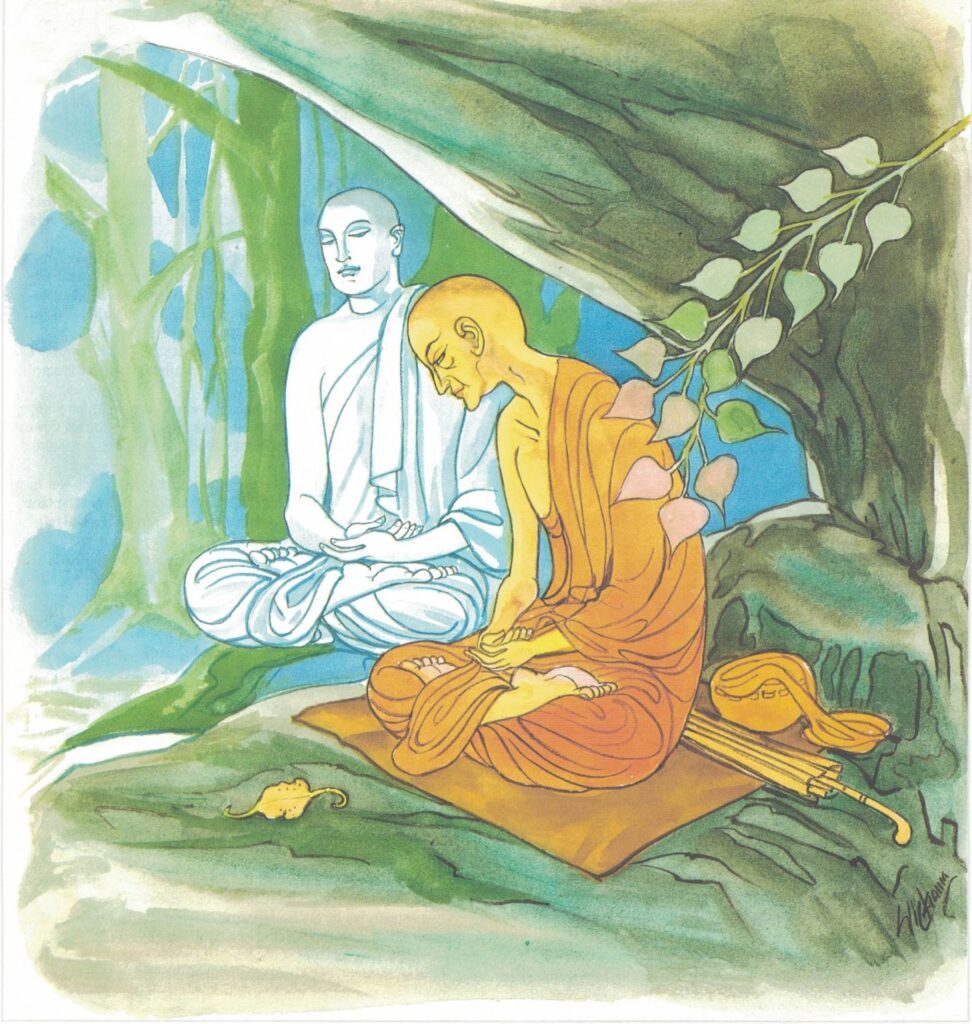Pali text, illustration and English translation of Dhammapada verse 367:
sabbaso nāmarūpasmiṃ yassa natthi mamāyitaṃ |
asatā ca na socati sa ve bhikkhū’ti vuccati || 367 ||
367. For whom there is no making ‘mine’ towards all name and form, who does not grieve for what is not, he’s truly ‘bhikkhu’ called.

The Story Of The Brāhmin Who Offered Alms Food To The Buddha
Once, there was a brāhmin in Sāvatthi, who was very generous and always offered alms-food to the Buddha and his monks.
One day, the Buddha saw the brāhmin and his wife in his vision and knew the couple would be able to attain Anāgāmi. Accordingly, the Buddha set out for their house and stood at the door. The brāhmin who was then having his meal did not see him. His wife saw him but she was afraid that her husband on seeing the Buddha, would offer all his food to the Buddha. Then she would have to cook again. With this thought in her mind, she stood in front of her husband so that he would not be able to see the Buddha. Then she quietly stepped backwards and slowly came to where the Buddha was standing and whispered, “Venerable! We do not have any alms-food for you today.” The Buddha just shook his head. Seeing his gesture, the brāhmin’s wife could not control herself and she burst out laughing.
At that instant, the brāhmin turned round and saw the Buddha. At once he knew what his wife had done, and cried out, ‘Wife, I am ruined. When our Venerable Teacher stood at the door you should have informed me. By failing to do so you have embarrassed me greatly.” Then, taking up his plate of rice, he approached the Buddha and apologetically requested, “Venerable! Please accept this rice which I have partly consumed. I am very sorry indeed that I have to offer you partly consumed food.” To him the Buddha replied, “O brāhmin! Any alms-food is suitable for me, whether it has been eaten or not.” The brāhmin was very happy because his offering of food was accepted by the Buddha and he next asked by what standard a monk was judged and how a monk was defined. The Buddha knew that both the brāhmin and his wife had already learned something about mind and body (nāma-rūpa), so he answered, “O brāhmin! One who is not attached to mind and body is called a monk.” At the conclusion of the discourse, both the brāhmin and his wife attained the third stage of sainthood.
Explanatory Translation (Verse 367)
yassa nāmarūpasmiṃ sabbaso mamāyitaṃ natthi
asatā ca na socati so ve bhikkhū iti vuccati
yassa: for some one; nāmarūpasmiṃ [nāmarūpasmi]: in name and form; sabbaso [sabbasa]: in all forms; mamāyitaṃ natthi: there is no selfishness; asatā ca: even when they decay; na socati: there is no weeping; so: that person; ce: certainly; bhikkhū iti: a monk; vuccati: is called
He has gone beyond the sense of his own name and form. To him, there is no existence of I, my or mine. If his name and form entity were to decay and deteriorate, he will not grieve. Such a person is called a monk.
Commentary and exegetical material (Verse 367)
nāma-rūpasmiṃ: mind-and-body; mentality and corporeality. It is the fourth link in the dependent origination (paṭiccasamuppāda) where it is conditioned by consciousness, and on its part is the condition of the six-fold sense-base. In two texts which contain variations of the dependent origination, the mutual conditioning of consciousness and mind-and-body is described, and the latter is said to be a condition of sense-impression (phassa).
The third of the seven purifications (visuddhi), the purification of views, is defined as the correct seeing of mind-and-body and various methods for the discernment of mind-and-body by way of insightmeditation (vipassanā) are given there. In this context, mind (nāma) comprises all four mental groups, including consciousness.
In five-group-existence (pañca-vokāra-bhava) mind-and-body are inseparable and interdependent; and this has been illustrated by comparing them with two sheaves of reeds propped against each other: when one falls the other will fall, too; and with a blind man with stout legs, carrying on his shoulders a weak-legged person with keen eye-sight: only by mutual assistance can they move about efficiently.